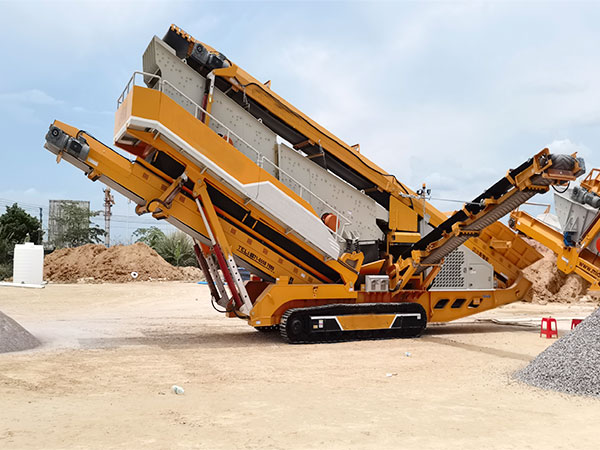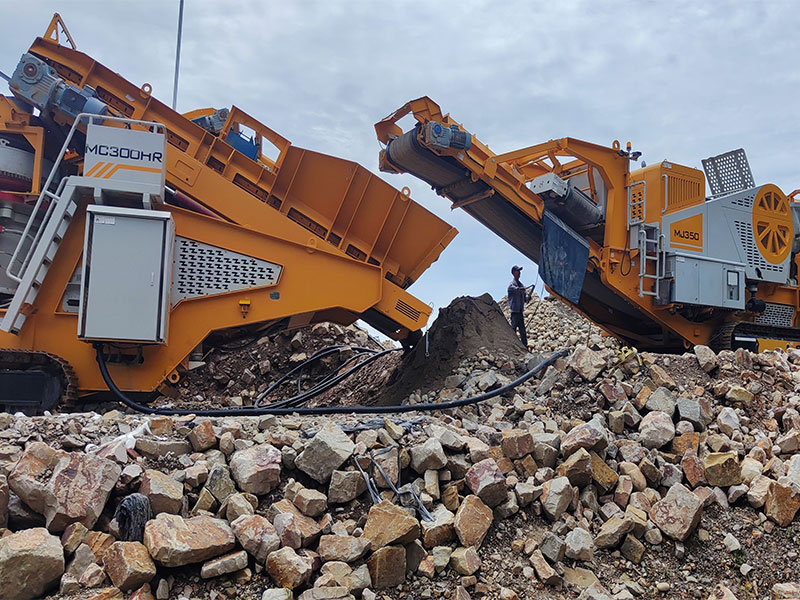In the ever-changing landscape of industry, the evolution of stone crushers has taken a greener turn, with a growing emphasis on reducing environmental footprints. As sustainability becomes a paramount concern, the stone crushing machinery industry is undergoing a significant transformation towards eco-friendly practices.
The Environmental Challenge:
The traditional image of stone crushers conjures up dusty quarries and heavy machinery churning out clouds of particulate matter. Recognizing the environmental impact of such practices, the stone crushing machine industry has embarked on a journey of transformation to minimize its carbon footprint, conserve resources, and contribute to a more sustainable future.

Smart Crushing Technologies:
At the forefront of the green evolution are smart crushing technologies that bring efficiency and sustainability into harmony. These technologies include advanced control systems that optimize crusher performance, monitor energy consumption, and ensure precise material processing. Smart crushers can dynamically adjust parameters to minimize energy usage while maximizing output, making them pivotal in the pursuit of sustainability.
Dust Suppression Systems:
Addressing the issue of airborne dust, modern crushing plants are equipped with advanced dust suppression systems. These systems use water or chemical solutions to control and suppress the release of dust during the crushing process, mitigating the environmental impact and improving air quality in and around crusher sites.
Eco-Friendly Power Sources:
The green evolution of stone crushers extends to their power sources. Manufacturers are increasingly incorporating eco-friendly power options such as electric motors and hybrid systems. By reducing reliance on traditional fossil fuels, these crushers minimize carbon emissions and contribute to a cleaner, more sustainable energy profile.
Recycling and Reuse Initiatives:
Stone crushers are evolving to become integral components of recycling and reuse initiatives. Crushed concrete, asphalt, and other construction materials can be processed and reused as aggregates, reducing the demand for fresh resources. This circular economy approach minimizes waste and lowers the environmental impact associated with quarrying new materials.
Material Efficiency:
Efforts to reduce environmental footprints are also evident in the design and manufacturing of stone crushers. Manufacturers are adopting lightweight and durable materials, optimizing the use of resources to create machines that are both efficient and eco-friendly. Material efficiency extends the lifespan of crushers and minimizes the need for frequent replacements.
Life Cycle Assessments:
A key trend in the green evolution of stone crushers is the implementation of life cycle assessments (LCAs). These assessments evaluate the environmental impact of crushers throughout their entire life cycle, from manufacturing and operation to disposal. By understanding the full spectrum of environmental effects, manufacturers can identify areas for improvement and make informed decisions to minimize ecological footprints.
Community Engagement and Collaboration:
Beyond technological advancements, the green evolution involves increased community engagement and collaboration. Stone crusher operators are actively seeking ways to integrate their operations harmoniously with local communities. This includes addressing concerns related to noise, dust, and visual impact, fostering a collaborative approach towards sustainable quarrying practices.
Biodiversity Conservation:
Sustainability in stone crushing is not limited to operational aspects; it extends to biodiversity conservation. Quarries are adopting responsible land management practices, integrating green spaces and conservation areas into their operations. This not only contributes to the preservation of local ecosystems but also enhances the image of the stone crushing industry as an environmentally conscious sector.
Regulatory Compliance and Certification:
The green evolution of stone crushers is reinforced by a commitment to regulatory compliance and certification. Manufacturers and operators are proactively aligning their practices with environmental standards and obtaining certifications that validate their commitment to sustainable and responsible crushing practices.
Conclusion:
The green evolution of stone crushers marks a pivotal shift towards a more sustainable and environmentally conscious industry. Through smart technologies, dust suppression systems, eco-friendly power sources, recycling initiatives, material efficiency, life cycle assessments, community engagement, biodiversity conservation, and regulatory compliance, the industry is reshaping its practices to reduce environmental footprints.
As stone crushers continue to evolve, the integration of green technologies and sustainable practices will not only minimize the impact on the environment but also contribute to the overall advancement of the industry. The green evolution is not just a trend; it is a commitment to responsible and eco-friendly quarrying and crushing practices that will shape the future of the mobile crusher plant for sale sector.

